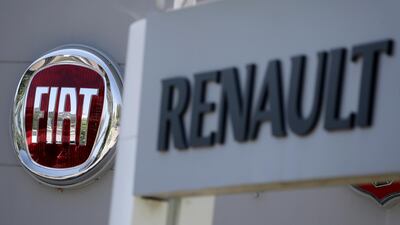Fiat Chrysler Automobiles abruptly withdrew its offer to combine with Renault SA after the French carmaker’s board -- on the brink of approving the deal -- postponed a decision for a second time.
Fiat’s bold move, upending a deal that would create the world’s third-largest automaker, came after Renault directors ended an hours-long meeting without taking a crucial vote. The French state, its biggest shareholder and the most important voice on the board, had requested deliberations be put off to a later date.
Renault said it would continue to review the proposal “with interest.” In its own statement, Fiat Chrysler took direct aim at the French government, owner of a 15 per cent stake in the French carmaker, for scuppering a deal.
“It has become clear that the political conditions in France do not currently exist for such a combination to proceed successfully,” Fiat said, adding that it remains convinced that the plan was compelling and carefully balanced.
The Italian-American maker of Jeep SUVs and Ram pickups had spent weeks navigating talks with Renault, its longstanding partner Nissan Motor Co. and the French state, which had ratcheted up demands over jobs, governance and factories. It had also pushed for a board seat and a payout to shareholders since the deal was announced on May 27.
"There’s nothing positive in the withdrawal of Fiat’s offer for Renault," said Takeshi Miyao, an analyst at Carnorama in Tokyo.
Fiat Chrysler shares fell 3.3 per cent to $12.75 (Dh47) in after-hours trading in New York. Nissan dropped as much as 3.8 per cent early Thursday in Tokyo. A deal would have created a company with a combined market value of 34.8 billion euros (Dh143bn).
The decision to walk away marks a significant retreat for Fiat Chairman and scion of the founding Agnelli family John Elkann. After discussions with Renault’s cross-town rival Groupe PSA, he had opted for the riskier path, proceeding with an offer for Renault despite the complications of the significant government shareholding and the company’s strained relationship with Nissan.
The breakdown of late-night talks just as a deal appeared to be in hand also leaves Renault Chairman Jean-Dominique Senard in a difficult position, having sought and failed to use his diplomatic skills to bring all the parties into agreement. In addition to the demands from the French state, French labor unions were worried about jobs and Nissan felt betrayed by a partner with which it was already trying to smooth rocky relations.
A first attempt to get the plan through ended Tuesday night when Renault’s board, meeting at its Boulogne-Billancourt headquarters outside of Paris, adjourned without deciding on the Fiat proposal. It said it needed to study the draft in detail.
The next night, Renault’s board was poised to approve the deal with Nissan representatives abstaining from the vote, according to people familiar with the matter. But France’s representatives asked for more time after officials made clear they wanted to discuss the deal further with Japanese officials before making a decision, they said. Finance minister Bruno Le Maire is planning a trip to Japan next week.
More time was needed to reassure the Japanese side and explain the deal, a French government official said, asking not to be identified under administration rules. The government was surprised that Fiat moved so quickly to withdraw its offer.
A spokesman for the minister didn’t return requests for comment.
Criticism of the proposal has gathered steam in recent days as Le Maire multiplied public comments on conditions the government was attaching to an eventual deal.
Nissan, which wasn’t formally part of the Fiat deal, nevertheless has an important role as Renault’s 20-year alliance partner, sharing technology to develop new models, purchasing components at scale and producing models from each brand in the same factories.
Nissan had withheld its support for the Fiat deal, raising questions about cost savings, technology sharing and other matters, despite Senard’s desire to win at least conditional backing from the Japanese manufacturer.
Questioned by reporters outside his home in Tokyo just hours after the collapse of the deal, Nissan CEO Hiroto Saikawa said he hadn’t heard anything official and repeatedly declined to comment.
Some Renault investors had also voiced doubts. Paris-based activist investment manager CIAM, in a letter to Renault’s board, said the merger with Fiat significantly undervalues Renault and that a 2.5 billion-euro dividend set to go to Fiat Chrysler shareholders should instead be paid to the French company.
Fiat Chrysler has been seeking a third partner since former CEO Sergio Marchionne and Elkann created the company in 2014 with Fiat’s full acquisition of the Detroit automaker. Even so, the late deal-maestro warned in a joint interview with Elkann that it is also crucial to end talks without the right conditions.
“It’s as important to walk away from the table as it is to sit down,” said Marchionne in 2014, while smoking Muratti cigarettes and sipping espresso at the carmaker’s test track of Balocco in Northern Italy.

